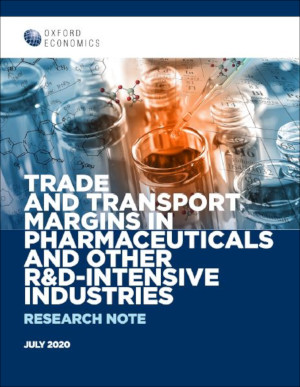Recent Release | 13 Jul 2020
Trade and transport margins in pharmaceuticals and other R&D-intensive industries


Spending for prescription and over-the-counter pharmaceutical products totaled $413 billion in 2012 according to the Bureau of Economic Analysis’ (BEA) trade and transports margin data. Just over half of this spending (52%) accrued to the pharmaceutical companies that produced the medicines, while the remainder was divided between transport and wholesale margins (21%) and retail margins (26%).
Compared to other research and development (R&D)-intensive manufacturing industries with significant consumer sales, the pharmaceutical and medicines manufacturing industry ranks second in terms of R&D intensity behind communications equipment, and receives the second lowest producers’ share of total spending after other miscellaneous manufacturing. Thus, the pharmaceutical industry is unique among manufacturing industries in that it devotes a large share of its revenue to R&D, despite receiving a considerably smaller share of total spending.
Tags:
You may be interested in

Post
Oxford Economics Acquires Majority Stake in Alpine Macro
We're excited to share that Oxford Economics has acquired a majority stake in Alpine Macro, a prominent global investment research firm based in Montreal, Quebec, Canada.
Find Out More
Post
Oxford Economics Leads 2025 Analyst Forecast Awards
We are honoured to receive a total of 103 awards in this year’s FocusEconomics Analyst Forecast Awards. Our team of over 400 economists and analysts demonstrated exceptional forecasting precision in both advanced and emerging economies, including the UK, Italy, Egypt, Brazil, Vietnam and more.
Find Out More
Post
Oxford Economics Launches Global Cities Index 2025
Oxford Economics is proud to launch the 2025 update of the Global Cities Index, which offers an evaluation of the world's 1,000 largest urban economies.
Find Out More